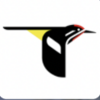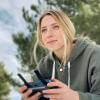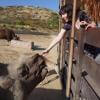With new technologies revolutionizing data collection, wildlife researchers are becoming increasingly able to collect data at much higher volumes than ever before. Now we are facing the challenges of putting this information to use, bringing the science of big data into the conservation arena. With the help of machine learning tools, this area holds immense potential for conservation practices. The applications range from online trafficking alerts to species-specific early warning systems to efficient movement and biodiversity monitoring and beyond.
However, the process of building effective machine learning tools depends upon large amounts of standardized training data, and conservationists currently lack an established system for standardization. How to best develop such a system and incentivize data sharing are questions at the forefront of this work. There are currently multiple AI-based conservation initiatives, including Wildlife Insights and WildBook, that are pioneering applications on this front.
This group is the perfect place to ask all your AI-related questions, no matter your skill level or previous familiarity! You'll find resources, meet other members with similar questions and experts who can answer them, and engage in exciting collaborative opportunities together.
Just getting started with AI in conservation? Check out our introduction tutorial, How Do I Train My First Machine Learning Model? with Daniel Situnayake, and our Virtual Meetup on Big Data. If you're coming from the more technical side of AI/ML, Sara Beery runs an AI for Conservation slack channel that might be of interest. Message her for an invite.
Header Image: Dr Claire Burke / @CBurkeSci

Explore the Basics: AI
Understanding the possibilities for incorporating new technology into your work can feel overwhelming. With so many tools available, so many resources to keep up with, and so many innovative projects happening around the world and in our community, it's easy to lose sight of how and why these new technologies matter, and how they can be practically applied to your projects.
Machine learning has huge potential in conservation tech, and its applications are growing every day! But the tradeoff of that potential is a big learning curve - or so it seems to those starting out with this powerful tool!
To help you explore the potential of AI (and prepare for some of our upcoming AI-themed events!), we've compiled simple, key resources, conversations, and videos to highlight the possibilities:
Three Resources for Beginners:
- Everything I know about Machine Learning and Camera Traps, Dan Morris | Resource library, camera traps, machine learning
- Using Computer Vision to Protect Endangered Species, Kasim Rafiq | Machine learning, data analysis, big cats
- Resource: WildID | WildID
Three Forum Threads for Beginners:
- I made an open-source tool to help you sort camera trap images | Petar Gyurov, Camera Traps
- Batch / Automated Cloud Processing | Chris Nicolas, Acoustic Monitoring
- Looking for help with camera trapping for Jaguars: Software for species ID and database building | Carmina Gutierrez, AI for Conservation
Three Tutorials for Beginners:
- How do I get started using machine learning for my camera traps? | Sara Beery, Tech Tutors
- How do I train my first machine learning model? | Daniel Situnayake, Tech Tutors
- Big Data in Conservation | Dave Thau, Dan Morris, Sarah Davidson, Virtual Meetups
Want to know more about AI, or have your specific machine learning questions answered by experts in the WILDLABS community? Make sure you join the conversation in our AI for Conservation group!
No showcases have been added to this group yet.
- @mdorigo
- | she/her
- 0 Resources
- 0 Discussions
- 3 Groups
- @stefan_istrate
- | he/him
Machine Learning Researcher & Nature Photographer. Building conservation tech for biodiversity monitoring at Wildlife Insights.


- 0 Resources
- 5 Discussions
- 9 Groups
Society for Conservation GIS


- 0 Resources
- 25 Discussions
- 5 Groups
Department of Conservation (New Zealand)
I work with the Terrestrial Biodiversity Team at the Department of Conservation, New Zealand. I'm interested in machine learning and spatial data science.
wekaResearch.com | doc.govt.nz

- 0 Resources
- 9 Discussions
- 4 Groups
GreenLab


- 0 Resources
- 20 Discussions
- 8 Groups
Welfare and Wildlife Conservation Data Scientist
- 0 Resources
- 0 Discussions
- 7 Groups
World Wide Fund for Nature/ World Wildlife Fund (WWF)
WWF-Tanzania GIS Specialist/Developer/Trainer
- 0 Resources
- 1 Discussions
- 7 Groups
- @MattyD797
- | He/Him
PhD Student | Cornell University | Smithsonian Institution; My focus is in computational ecology within fishery acoustics


- 0 Resources
- 16 Discussions
- 12 Groups
- 0 Resources
- 0 Discussions
- 1 Groups
- @JackEdney
- | He/Him
Machine Learning Engineer specialised in computer vision and a passion for conservation and rebuilding.
- 1 Resources
- 1 Discussions
- 5 Groups
Luxembourg Institute of Science and Technology
Undertake and develop biodiversity monitoring


- 6 Resources
- 10 Discussions
- 4 Groups
My name is Caroline from Nairobi Kenya. I am a new entrant into wildlife conservation space and am looking forward to learning a lot more
- 0 Resources
- 2 Discussions
- 2 Groups
Jacqueline Ramos explains how artificial intelligence can help to track and prevent chimpanzee trafficking across the globe.
6 February 2019
The Open Data Institute and the Office for AI are partnering to explore how data trusts could help to solve environmental, societal and industry challenges by enabling increased access to data while retaining trust....
31 January 2019
With the aim of advancing rewildling-related technology in the UK and introducing new talent and ideas into the field of rewildling, Ecosulis is thrilled to announce the launch of their first ever Rewilding Tech...
14 January 2019
A team of Brazilian biologists supported by the Conservation Leadership Programme (CLP) is unlocking the secrets of one of the world’s most fragile and threatened biodiversity hotspots thanks to the success of a...
22 November 2018
Ted Schmitt joined us for a lunchtime lecture in which he shared his experiences working across Africa the past five years with protected area managers, anti-trafficking organisations, and scientists to effectively...
22 November 2018
Machine learning is widely recognized as the solution to camera trap data processing, but a user-friendly and broadly-accessible system for putting this tech to use has not yet been developed. In this case study,...
1 October 2018
Article
In this case study, conservation ecologist Ayesha Tulloch takes us behind the scenes of her recent paper, which came out in Nature Ecology & Evolution earlier this month. In this paper, Ayesha and her team present a...
20 August 2018
The winners of our Human Wildlife Conflict Tech Challenge are offering regular updates throughout the year to chronicle their failures, successes and what they learn along the way as they develop their solutions. In...
27 July 2018
Looking to prototype or pilot a new conservation tech idea or approach? Conservation X Labs is running an idea competition for teams to create a first draft (i.e. prototype) of their conservation solution. 20 finalists...
11 June 2018
Conflict between humans and wildlife is increasing as human communities expand and wild habitats are destroyed, prompting need for new mitigation techniques. As a winner of the Human Wildlife Conflict Tech Challenge,...
19 April 2018
Hundreds of people joined our #Tech4Wildlife photo challenge this year, showcasing all the incredible ways tech is being used to support wildlife conservation. We've seen proximity loggers on Tasmanian Devils in...
3 March 2018
Following the UK Government’s landmark announcement of plans to introduce a complete ban on the domestic trade in ivory, it was fitting that a new machine learning product designed to tackle the supply end of this...
6 December 2017
August 2025
event
September 2025
event
event
event
event
October 2025
event
event
event
December 2025
event
March 2026
March 2024
event
February 2024
17 Products
Recently updated products
| Description | Activity | Replies | Groups | Updated |
|---|---|---|---|---|
| For the record now that this is here:This error typically occurs when the wrong number of classes is given to timm.create_model. You should try to specify num_classes=30... |
|
Camera Traps, AI for Conservation | 10 months ago | |
| WildMon, Terra Genesis, The VF Foundation, Thaksin University, and the Wanakaset Symbiosis Network have teamed up on a new project in... |
|
Acoustics, AI for Conservation, Community Base | 10 months 1 week ago | |
| Do you use camera traps? If so, we'd love if you could take five minutes to fill out this survey: tinyurl.com/zambasurveyWith our WILDLABS... |
|
AI for Conservation, Camera Traps, Data management and processing tools, Software Development, Open Source Solutions | 10 months 2 weeks ago | |
| I'm not affiliated, I just happened across it... not sure who is actually leading it. |
|
Software Development, Early Career, AI for Conservation, Citizen Science, Climate Change, Conservation Tech Training and Education, Funding and Finance | 10 months 2 weeks ago | |
| Great and difficult question Lisa! I think, yes, we are adding to the problem. We have been already when ML was introduced as a solution to big data problems, and perhaps we have... |
|
AI for Conservation | 10 months 2 weeks ago | |
| Odor based methods would be interesting. Provided they didn't need to be replenished too often.We find varied stimulus prevents habituation. |
+6
|
AI for Conservation, Conservation Tech Training and Education, Emerging Tech, Human-Wildlife Coexistence | 10 months 3 weeks ago | |
| Thank you John. |
|
AI for Conservation | 10 months 3 weeks ago | |
| Hello everyone!Check out our new paper on "Reliable and efficient integration of AI into camera traps for smart wildlife monitoring." We... |
|
AI for Conservation | 11 months ago | |
| Hi Karen,Yeah the discharge curves of lithium cells tend to be very stable for a long time and then drop sharply at the end. Akiba and Brett's advice below re: condensation... |
|
Camera Traps, AI for Conservation | 11 months ago | |
| Hi @benweinstein !Surely a general detector might be very useful for detecting objects in aerial imagery! Maybe something similar to what MegaDetector does in camera trap images,... |
|
AI for Conservation, Open Source Solutions, Protected Area Management Tools, Drones, Geospatial | 11 months 1 week ago | |
| Thank you!! |
|
AI for Conservation | 11 months 2 weeks ago | |
| Agreed. I have recently begun using SegmentAnything as a replacement for Detectron and have been very pleased. However, for a fish school I don't know how well it would do out of... |
|
Data management and processing tools, AI for Conservation | 1 year ago |
WILDLABS Virtual Meetups Season Four: Tracking Progress
29 April 2022 9:57am
News: The Latest in Conservation Tech (March 24)
24 March 2022 12:00am
Apply now: Women in Conservation Technology Programme, Kenya
8 March 2022 12:00am
BirdCLEF 2022 Kaggle Challenge
 The Cornell Lab of Ornithology
The Cornell Lab of Ornithology
2 March 2022 12:00am
Introducing the WILDLABS On the Edge Fellows
10 February 2022 12:00am
WILDLABS Fellowships & Awards: Matchmaking between tech and conservation
28 January 2022 3:22pm
Deep Learning for Marine Ecology and Conservation
20 December 2021 12:00am
AI for Conservation Office Hours: are you interested?
8 October 2021 12:00pm
14 December 2021 2:47pm
We've now wrapped our first run of AI for Conservation Office Hours and you can read my review of how it went and lessons learned here.
Given the overall success of the programme, we're excited to announce that in early spring next year we will be coordinating a second round - so keep an eye out for further updates in the new year on the application and sign-up process.
Also, we'd love to know whether you'd be interested in having a 1:1 so comment below and tell us what conservation tech challenge you would like to cover or how a session could help you in your conservation work.
Many thanks,
Lucas
AI for Conservation Office Hours: 2021 Review
14 December 2021 12:00am
Low-cost underwater camera trapping and deep learning
30 November 2021 12:00am
The race to save California's rarest butterflies
29 November 2021 12:00am
Environmental Data Justice
26 November 2021 12:00am
Technical Difficulties: The Promise and Pitfalls of Machine Learning for Conservation
 Sara Beery
and 1 more
Sara Beery
and 1 more
23 November 2021 12:00am
Caiman: Images as Sources of Intelligence
18 November 2021 12:00am
Try our open-source automatic camera trap detection/labeling tool!
12 November 2021 8:39pm
Opportunity: GEO-Microsoft Planetary Computer Programme
4 November 2021 12:00am
EarthRanger Announces Inaugural Conservation Tech Award Recipients
3 November 2021 12:00am
Opportunity: PhD or Postdoctoral Research Fellowships - Chinstrap penguin biologging
1 November 2021 12:00am
Using IoT and Machine Learning to help protect Kenya's Rivers
21 October 2021 12:00am
Tech Tutors: How do I analyze large acoustic datasets using PAMGuard?
14 October 2021 3:42pm
How do I analyze large acoustic datasets using PAMGuard?
7 October 2021 12:00am
Call for Papers: Special Issue on Computer Vision Approach for Animal Tracking and Modeling
20 September 2021 12:00am
Tech Tutors: How do I use AI to fight wildlife crime?
1 September 2021 10:59pm
Which are major open challenges that AI can help to solve in nature conservation ?
28 April 2021 9:15am
4 August 2021 5:00pm
I would perhaps ask this in a new thread, so the rest of the community can see it! (as opposed to a reply here, where only the people in the conversation are notified of more replies).
13 August 2021 10:04pm
Elizabeth Bondi has work on detection from thermal imagery taken by drones! I'd look at her papers :)
27 August 2021 10:51am
Looks good, but what is the added value compared to other examples as Obsidentify and Plantnet?
AI/ML Engineer Job at Dryad
26 August 2021 2:45pm
Widening the Bottleneck: Can Citizen Science Accelerate Conservation?
19 August 2021 12:00am
Open positions in ML & conservation/climate sci
18 August 2021 2:22pm
Geo for Good Lightning Talks: Nature Conservation
 Google Earth Outreach
Google Earth Outreach
17 August 2021 12:00am
Building Sustainable Support with Edge Impulse
13 August 2021 12:00am
Accessible Tech and Real Impact with the WILDLABS Fellowship: On the Edge
9 August 2021 12:00am

















































25 October 2021 4:13pm
Hi Wildlabbers!
We're now going ahead with a small pilot of around ten 1:1 office hour sessions with Microsoft AI for Earth specialists. More details coming very soon.
For the time being sign-ups are now closed, but thank you to everyone who has been interested. We will keep you updated on how the 1:1s go and whether there will be further sessions to sign up for later in the year.
Cheers,
Lucas